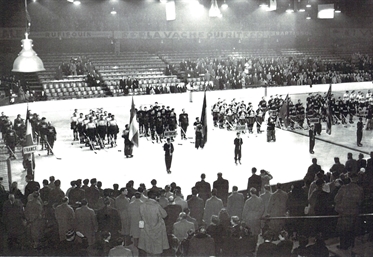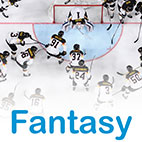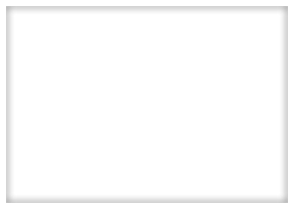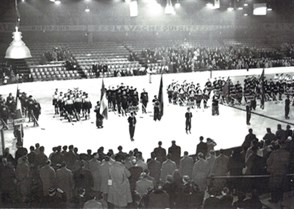Worlds in Paris in... 1951
Worlds in Paris in... 1951
Canada’s “Cinderella team” wins gold 66 years ago

 The opening ceremony of the 1951 IIHF Ice Hockey World Championship in Paris. Photo Courtesy James Sinclair collection
The opening ceremony of the 1951 IIHF Ice Hockey World Championship in Paris. Photo Courtesy James Sinclair collection
Canada’s Cinderella Team
The Lethbridge Maple Leafs were said to be one of the greatest “Cinderella teams “of all time in hockey. The year before the World Championship they were a collection of recreational players; self-organised mainly for exercise, their love for playing the game and to play in Lethbridge, a small city in western Canada.
They had no sponsor, no money, sharpened their own skates, worked at full-time jobs, designed their own uniform and practiced at hours “only the night watchman knew”. With only six NHL teams, there were hundreds of very good Canadian amateur hockey teams to select to represent Canada. The Lethbridge Maple Leafs were chosen after winning the Western Canada championship the season before.
The Canadian Amateur Hockey Association (CAHA) came under “harsh criticism” for the decision to have the Leafs represent Canada. The Lethbridge Maples Leafs selection to represent Canada and win the World Championships is one of the greatest stories in amateur sport in Canada.
By the time they were headed back to Canada from their European tour, the “Cinderella” Maple Leafs were World Champions and Sir Winston Churchill Cup winners. Their impressive record of 51 wins, 7 losses and 4 ties ended on a 44 game unbeaten string.
The Journey
On their journey to the championships the Maple Leafs had travelled close to 30,000 miles by bus, train, ship, airplane and car and played before about 400,000 people in 14 countries.
The Maple Leafs had played in magnificent indoor rinks to capacity crowds, such as 15,000 in Zurich. They had also played in outdoor rinks in dangerous yet humorous conditions. In Germany the players plowed the snow off the outdoor rinks every five minutes in a snowstorm before 12,000 fans cheering wildly for encouragement. At one stop, local officials pounded tacks into the bottom of pucks to make them slide better. They added venues as people wanted to see the Canadian team. The Leafs played in a small town with grandstands made of snow to accommodate 2,500 hockey fans. At times, the Leafs played on melted ice, running instead of skating and using golf shots but continued the game as they did not want to disappoint the thousands of small town fans.
“I believe it is one of the most unique stories of the history of Canadian amateur hockey. We played for the love of the game, the fellowship and the occasional beer,” Tom Wood said.
The Worlds in Paris
After playing other games in Europe as preparation, the team coached by Dick Gray and captained by Hec Negrello arrived in Paris for the 1951 IIHF Ice Hockey World Championship that took place 9-17 March at Palais des Sports. 13 countries came to the event and were split into two groups, a seven-team round robin battling for the title and six teams in a challenge group that would later become the B-Pool and Division I.
The World Championships started on 9 March 1951 with the opening ceremony for the 13 countries that brought with them 225 hockey players. The goaltender from each team carried their country’s flag and led their team’s procession.
Goalie Mallie Hughes led the Canadians onto the ice. The team followed the goalie in rows of three. The nations entered the arena in alphabetical order and someone yelled to Mallie, "Hold our flag high Mallie, it's a pretty good flag".
At that time Canada didn’t have the red-and-white maple leaf flag we know and was introduced in 1965 but the Red Ensign containing the Union Flag as used in the flag of the United Kingdom. But the maple leaf was on the jerseys of the players since they used their club logo.
Teams from Austria, Belgium, Canada, the United States, Finland, Great Britain, the Netherlands, Italy, Norway, Sweden, Switzerland, Yugoslavia and the hosts from France all skated around the ice in front of a battery of cameraman, newsreel cameras and TV cameras. After lining up in order, La Marsellaise was played and IIHF President Dr. Fritz Kraantz welcomed the countries.
The Lethbridge Maple Leafs went on to defeat Finland, Norway, Great Britain, the United States and Switzerland before meeting Sweden, which was also undefeated in five games, on the last day.
The Championship Game
A full house of 17,000 packed the Palais des Sports in Paris to watch the championship game between Canada and Sweden. The Lethbridge Maple Leafs from Canada emerged with a 5-1 win and the World Championship!
The Swedish team decided to play a very defensive strategy. Even if they lost the game, if they limited the number of goals Canada scored, Sweden would get the silver medal and the European Championship title on goal against average over the Swiss, who also had nine points. While they were determined to win, they did not want to let Canada score many goals against them.
The Maple Leafs’ Don MacLean scored the first goal early from a Bill Gibson pass. Then Gibson set up a goal from Captain Negrello to put the Maple Leafs up 2-0. The third goal was Mickey Roth's from a Bill Flick setup. Sweden then got on the score sheet with their only goal. The crowd had started off favouring the Swedish team as underdogs. However, after MacLean scored his second goal to go up 4-1, the crowd started to admire and cheer the Canadian team. Roth finished off a play from Denny Flanagan and Flick to end the scoring.
Stan Obodiac wrote: "All of a sudden the game was over... we were world champions. We hugged each other like a bunch of school boys. There were movie cameras and a battery of cameramen all about. Then they played ‘O Canada’ and raised our flag for the victory. We all faced it as it rose to the top. Bill Gibson had a tear in his eye. Tommy Wood said it was the happiest day of his life.”
The World Championship trophy was presented to Captain Hec Negrello on a pedestal at centre ice, Sweden won silver and Switzerland bronze. The Maple Leafs then carried the trophy on a victory lap around the rink to the applause of the large crowd.
In the six World Championship games, the Leafs scored 62 goals and only allowed 6 goals against! The victory brought their winning streak to 40 straight.
So ended the greatest days of our life!" Obodiac wrote.
Experience of a Lifetime
The players started out as a group of players with a love for the game organizing an exercise team in a Lethbridge, a small city in western Canada. They endured an exhaustive travel schedule away from home, illnesses that resulted in the few losses, money issues including lost wages, politics resulting in several line-up changes and harsh weather conditions. However, they also received overwhelming hospitality and welcome from the countries, great support from home, enthusiastic support from hockey fans everywhere, saw post-war Europe and many world-class tourist destinations. And they enjoyed great success on the ice. The players ended with the experience of a lifetime and the Lethbridge Maple Leafs ended as World Champions and one of the greatest “Cinderella” teams for Canada. They arrived home to a hero’s welcome with banquets, parades and many platitudes.
Click on the right (desktop version) or here to watch a video on the 1951 IIHF Ice Hockey World Championship in Paris, the last one held in the French capital that in May will co-host the 2010 IIHF Ice Hockey World Championship.
Go to www.lethbridgemapleleafs.com for a complete history of their journey including photos, stories, newspaper clippings, first-hand player accounts and more.
Acknowledgements
We would like to thank James Sinclair, Lethbridge Museum and Archives and the Obodiac family for permission to use many of the references and photos on our site
References
www.Lethbridgemapleleafs.com written and maintained by Trevor Esau and Darcen Esau.
Obodiac, Stanlee (1922-1985) [info]. No substitute for victory: The story of the Canadian world hockey victory. Yorkton, Sask.: Printed by The Redeemer's Voice Press, 1952. To read this book click here.
Back to Overview


































































































